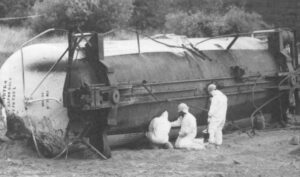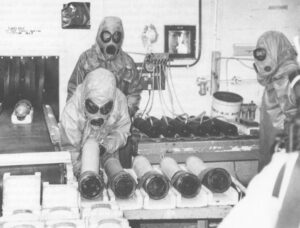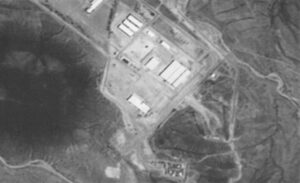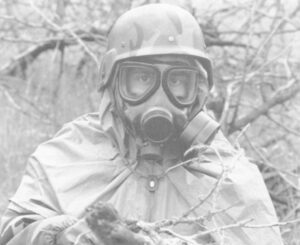James Borg
- 1991

Fellowship Title:
- Chemical Disarmament, Proliferation and War
Fellowship Year:
- 1991

When Post-Cold War Worlds Collide: Chemical Weapons Destruction Meets Environmental Politics
Richmond, KY-Across gently rolling grassland just east of Clark-Moores Middle School, the Lexington-Blue Grass Army Depot sprawls in sad tribute to a national security agenda that is no longer relevant. Since the early days of the Cold War, the 15,000-acre installation has sheltered thousands of rockets and artillery rounds containing chemicals designed to disrupt breathing and other bodily functions, often with deadly results. These so-called nerve agents-liquids with the arcane designations GB and VX – have never been used in combat. The third type of agent stored here, mustard, meant to sideline soldiers by blistering their lungs and skin, hasn’t seen wide service since World War I. Yet tens of thousands of tons of those compounds were manufactured and stored against the possibility of war with the former Soviet Union. Now decades-old and obsolete, these relics of East-West confrontation put the Pentagon in a bind. Emergency workers wearing protective gear plug a hole in the side of a railroad tanker near Dunsmore, California. The car spilled 19,000 gallons of a powerful weed killer into the

Tending the Dragon’s Fire: Shall We Bake, Steam or Baste Our Obsolete Chemical Weapons?
From the air over the whitecaps of the central Pacific, Johnston Atoll looks like an aircraft carrier scuttled in a green lagoon. Two miles long and a half-mile wide, the concrete-and-coral island stands about six feet above sea level. Its dominant feature, an airfield, takes up nearly the entire length. Thirty years ago, this sparse and isolated speck provided the launching pad for America’s last atmospheric nuclear weapons tests. One high-altitude explosion lit up the night sky in Honolulu, 825 miles to the northeast. Johnston Island, a chemical weapons storage and destruction facility in the Pacific Ocean, has no indigenous population. Military service workers, federal civilian employees and government contract workers make up its work force of about 1,300 people. The island has been evacuated twice in the face of hurricanes Celeste in 1972 and Keli in 1984. (Department of the Army Photo) Less spectacular than nuclear pyrotechnics, Johnston’s modern-day duty is equally fearsome. The first cities are rows of storage igloos and wisps of vapor rising from an industrial complex on the southeastern shoreline.

Outlawing Chemical Weapons
How intrusive searches and disposal problems are hampering talks toward an historic ban on possessing war poisons. At the sound of approaching aircraft, Farouk Abdullah, an elder in the northern Iraqi village of Ekmala, squinted up at the brightening summer sky. It was an unusual sound for this Kurdish hamlet. Five warplanes swept into view and dropped a series of bombs. Rather than exploding loudly, the bombs produced a muffled burst and billows of yellow clouds. The smell was reminiscent of onions or garlic. As cries of alarm rose from the mountain community, Abdullah ran. “Many people fell down, but I could not see clearly,” he recalled. “I tried to run away from the smoke, but then the wind changed. I tried to run back, but I fell and began to vomit.” As Abdullah recovered over the next few days, he watched his world change. “The leaves fell off the trees,” He told a U.S. Senate investigative team. “The fish in the brook died. Anyone who touched the clothes of the dead people became blind.”

The World’s Armies Agree: Gas Masks Are Here to Stay
WASHINGTON-For Gen. H. Norman Schwarzkopf, it would have been a hellish dream come true-allied ground troops pinned down by Iraqi forces and pummeled with chemical rockets and artillery. At his briefing in Riyadh, Saudi Arabia on Feb. 27, the fourth day of the ground war in the Persian Gulf, Schwarzkopf pointed at a chart showing penetration lines in the campaign to liberate Kuwait. Colored symbols represented the advancing 1st and 2nd Marine divisions and the Army’s 2nd Armored Division’s “Tiger Brigade.” They were pushing into Kuwait southwest of Al Jahrah, about 40 miles from the Gulf. “The nightmare scenario for all of us would have been to go through, get hung up in this breach right here and then have the enemy artillery rain chemical weapons down on troops that were in a gaggle in the breach right there,” he said. The allied commander later added, “We had a lot of questions about why the Iraqis didn’t use chemical weapons, and I don’t know the answer. I just thank God that they didn’t.” The new
